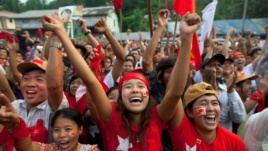VOA慢速英语:印度和缅甸的选举关键在经济
From VOA Learning English this is As It Is. I’m AnnaMatteo in Washington.
On this Saturday’s show we will hear about issuesaffecting the economy in India and social reform inBurma. We will also explore how upcoming nationalelections could affect both countries.
Social reform in Burma seems to be slowing. Andexperts wonder how the upcoming election in 2015 willaffect foreign investment there. Keep listening to learnmore in the second half of our show.
But first, Mario Ritter reports on some possible goodnews for India’s slow-growing economy.
Hopes Rise That India’s Economy Will Improve
India is hoping its economy will improve. In the last two years, economicgrowth dropped to its lowest levels in ten years. But there are few signs that the economy could return to the high growth rates that once made India one of the world’s fastest-growing economies.
Gurdet Singh grows crops on about 40 hectares of fertile land in northernPunjab state. The area is financially successful because of farming. Mr.Singh says he plans to buy a new and bigger tractor to make his work easier. Mr. Singh is so successful that he hopes to buy a car after he pays the loansfor his new tractor.
India’s automobile manufacturers have suffered severe financial problemsduring the past two years. Industry officials are hoping that people like Mr.Singh and others in rural areas will begin buying cars again.
Vishnu Mathur is the head of the Society of Automobile Manufacturers ofIndia. He says there is weak demand in urban areas for passenger cars. But, he says economic gains in India’s rural areas could help carmakers.
Good feelings about the car industry may be a signthat the worst could be over for the Indian economy. But, they say the country’s agricultural industry willshow better growth. The Indian currency, the rupee,lost more than 20 per cent of its value compared to thedollar last year. That should help India’s exports, whichare increasing.
 |
|
The Indian Rupee as flower decoration. |
Rafique Ahmed is the head of the Federation of IndianExport Organizations. He says exports are growingbecause of the devalued rupee and better global economic conditions.
While growth is widely expected to increase, economists say it is unlikely toreach levels seen in 2011, for example, when growth was nine percent.
Economists say confidence among investors -- both in India and in othercountries -- must return before the Indian economy can improve. Privateinvestment has slowed because investors are concerned by the lack ofreform and government barriers to business. Many investors and businessesare waiting to see whom voters will choose to lead the country in nationalelections to be held by May.
Finance Minister P. Chidambaram has said growth will increase to more thansix per cent in 2014.
I’m Mario Ritter.
And I’m Anna Matteo in Washington. You are listening to VOA LearningEnglish.
Now on to Burma. When military rulers began reform policies in 2011, mostnations ended their restrictions against Burma. But experts now fear thatreforms are slowing as Burma nears its 2015 national elections. Here is FaithLapidus with more.
Experts Fear Burma's Reforms Stalling
Some experts fear that rights reforms in Burma are slowing ahead of nationalelections planned for 2015. The Asian Development Bank has said thatBurma, also known as Myanmar, can become a middle-income country by 2030. To do so, however, the economy must continue to grow at more thansix per cent a year.
Burma’s military rulers began reforming its economic and political systems in 2011. These reforms led most nations to end restrictions against Burma.
John Hancock is an Australian lawyer and expert on Burma. He says Burmahas made strong progress in the past six to seven years. He adds thatforeign investors see opportunity for profits in Burma.
 |
|
Burma's Electorate (photo by Paula Bronstein/Getty) |
However, Mr. Hancock says that Burma must rebuildgovernment operations and complete land reforms. Hesays the government must increase spending oneducation and roads and power systems.
More than 25 per cent of Burma’s 61 million people livebelow the national poverty level. Many of the poor live inrural areas.
Aung Zaw is the editor of the Irrawaddy newspaper. Hesays many in Burma fear the reform efforts will not beenough. He says poor supervision of land records leaves people in danger oflosing their land.
Aung Zaw says there is evidence that the Burmese army has forced villagersout to make room for foreign investment. He says foreign investors haveshown interest in new Special Economic Zones. But, he says, these neweconomic areas come with huge social and environmental costs. He saysoften villagers are forced from their homes without fair payment.
The government of Australia has warned investors that people and companieswith close ties to Burma’s military influence many areas of the economyincluding the oil, gas and wood industries.
Sean Turnell is an economist at Macquarie University in Sydney, Australia. Hesays agriculture reform has slowed in Burma although a majority of Burmesemake a living through agriculture.
Mr. Turnell says that without land rights farmers have limited opportunity toborrow money at fair rates.
Experts say some who fear changes in Burma are trying to slow reforms bycreating ethnic and religious conflict ahead of the planned 2015 elections.
I’m Faith Lapidus.
I’m Anna Matteo. You can share your thoughts and practice your writtenEnglish by leaving us a comment! You can also connect with us throughFacebook, Twitter, iTunes and LinkedIn. And join us next time for another As It Is on VOA Learning English!
- 频道推荐
- |
- 全站推荐
- 推荐下载
- 网站推荐




















